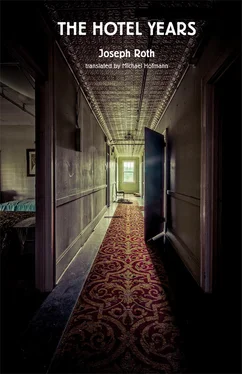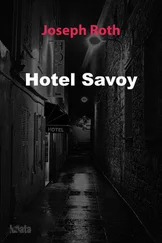Joseph Roth - The Hotel Years
Здесь есть возможность читать онлайн «Joseph Roth - The Hotel Years» весь текст электронной книги совершенно бесплатно (целиком полную версию без сокращений). В некоторых случаях можно слушать аудио, скачать через торрент в формате fb2 и присутствует краткое содержание. Год выпуска: 2015, Издательство: New Directions, Жанр: Прочая документальная литература, Прочая документальная литература, Культурология, Классическая проза, на английском языке. Описание произведения, (предисловие) а так же отзывы посетителей доступны на портале библиотеки ЛибКат.
- Название:The Hotel Years
- Автор:
- Издательство:New Directions
- Жанр:
- Год:2015
- ISBN:нет данных
- Рейтинг книги:3 / 5. Голосов: 1
-
Избранное:Добавить в избранное
- Отзывы:
-
Ваша оценка:
- 60
- 1
- 2
- 3
- 4
- 5
The Hotel Years: краткое содержание, описание и аннотация
Предлагаем к чтению аннотацию, описание, краткое содержание или предисловие (зависит от того, что написал сам автор книги «The Hotel Years»). Если вы не нашли необходимую информацию о книге — напишите в комментариях, мы постараемся отыскать её.
Frankfurter Zeitung
The Hotel Years — читать онлайн бесплатно полную книгу (весь текст) целиком
Ниже представлен текст книги, разбитый по страницам. Система сохранения места последней прочитанной страницы, позволяет с удобством читать онлайн бесплатно книгу «The Hotel Years», без необходимости каждый раз заново искать на чём Вы остановились. Поставьте закладку, и сможете в любой момент перейти на страницу, на которой закончили чтение.
Интервал:
Закладка:
Thus the village, but I wasn’t able to listen to it for long. Until mid-December we were twenty miles east of there, on a quiet sector of the front. It was as though the village extended its benedictions to the trenches.
We were already receiving early Christmas parcels, and of course not opening them. I should say: I didn’t receive any myself; I would certainly have opened them if I had, to be honest. I’ve always hated surprises. I neither wanted to give nor to get any. I was all alone amidst the expectant merriment of my comrades. Yes, our sector was quiet. But we had stood and continued to stand in the face of death. I was upset at the way men who had stared death in the face now collapsed into the tinsel and mawkishness that for the past hundred years or so had marked the birth of our Lord. To tell the truth, I was trembling at the thought of Christmas, or rather the things attending it. I fervently wished not to get any parcels from home — what was home anyway but a kind of glorified hinterland? — or consolatory surprises from my comrades. Nowhere had the manger at Bethlehem felt so near or the “parlour” with its “gifts” so far. “Christmas in the field” was something for war correspondents.
Then a miracle happened, not a postcard miracle, but a real one. We went into furlough on 19 December. We went to Jablonovka. You see, the village says, it can happen. It was deep in snow. Icicles dangled from the thatch over the tiny windows at the back. And when I wanted to look out onto the wintry street from the hut I’d been quartered in, I had to take a candle and melt a hole in the ice on the window. It closed up again in no time. The temperature was twenty below.
On Christmas Eve the peasants came into regimental HQ. They asked us for sixteen candles. Hanamak, our warrant officer, produced eight, and cut them in half. Boys carved faces in hollow pumpkins, lit the candles inside them, and each of them had three pumpkins, and those were their Three Kings. Five boys, all sons of Frau Olszewska, had a manger they had carved themselves. It was a tiny hut, no more than fifteen inches high, painted green, three walls, an open stage. There were little bundles of actual hay inside. And if you poked your finger through a ring on the gable of the house, the whole thing seemed to rock by itself, and inside Mary was rocking her infant, the grey donkey shook its long grey ears, and the miniature Three Kings, who came out dressed in scarlet and gold, moved their trembly sleeves that were looped onto their wrists with thread. The star of Bethlehem shone within, as though it had come crashing through the thatch, and it turned out not to be a star at all, but a gold rosette as worn by our k. & k. officers. The war had reached Jablonovka after all.
The peasant woman I was billeted with was called Josefova Gargas, and I will never forget her. Although many of the village women had been widowed over the course of the war, she was the only one who was referred to as the Widow. Because her husband had died a natural death six months before the war began. She had three-year-old twins, a couple of winning bundles of flax. Her bony face enjoined her to silence and severity. But if you came to know her better, it was nothing but a doomed effort to suppress the kindness and goodness within her.
Karl Greiser, ensign, and pork-butcher in civilian life, slaughtered a pig. The widow scrubbed the floor, the table, the three chairs. When evening came, she set out a great dish with red stripes and blue flowers round the rim in the middle of the table. Two immense stoneware plates flanked it like children. Three wooden spoons, pale yellow as the table they lay on, looked like its children: they were wood of its wood. Kindling laid crosswise waited on the open hearth. And the heads of the twins smelled of that mustardy wartime soap: a smell of lye, dirty washing and poverty, especially poverty.
The mercury neither rose nor fell — and that was fine. A nothing sort of day disappeared into a clear night. Who could say how long we would remain here on furlough? Who could say where we would be dispatched to next? I dislike atmospherics. The field-post is carried out. Two parcels, all of two parcels. We are summoned to the officers’ mess at eight, Rainacher and I. He dislikes atmospherics as well. We are both billeted with the widow Josefova. Because he has seniority, he sleeps in the bed, while I sleep on a straw mattress on the floor. We both excuse ourselves. We can’t make the mess. We walk up the hill to midnight mass instead.
The sky glitters overhead, the snow glitters under our feet. It’s as though the sky is a reflection of the snow. There’s no point following the village street, which is all trampled. The snow was so seductive that it would have been a sin not to walk there, where it lay crisp and deep, noble, virginal, crystal and singing. So as not to encounter our comrades and to enjoy the night and the stars and the snow, we walked up the lane behind the houses. It was peaceful, no war anywhere. Ten or twelve times a searchlight crossed the sky, but even that seemed to be a kind of strolling, a peaceable pedestrian, paler than its brothers whom I knew better in the luminous sky.
The boys came in with their pumpkin lanterns. They sang. Stable and manger and donkey were nearby, if you could follow the singing. If you could believe them, the Saviour was born in Jablonovka, not far from Josefova Gargas’s hut, and not two thousand years ago, but sixty at the most, and the oldsters still remembered the event. You could practically see the footprints of the Three Kings in the snow. The star was graspable. The Podolian plain was swaddled in faith, God was in Podolia, and Bethlehem was a hop and a skip away, much closer than the front.
Lights went out one after another, and the huts went dark. Only the sky and the snow were still gleaming as the village traipsed up the hill to the church. Its double doors were thrown open, and it was as though the altar was coming out to meet you, to welcome the visitors in its splendour. There were no pews. People stood and knelt. Although the doors were left open, it soon grew warm, it was as though the furs were warming me, and the candles, and the fervour and the Gloria after the Introitus: Dominus dixit ad me: filius meus es tu, ego hodie genui te. Quare fremuerunt gentes; et populi meditate sunt inania ? What are the heathens purposing? What folly are the peoples pursuing? — Et pastores erant in regione eadem vigilantes . — And there were wakeful shepherds in that place — they were here next to us, next to Rainacher and me. We took the widow Josefova Gargas home between us. The door wasn’t locked, no door in the village was ever locked, even though strange troops, Hungarians and Bosnians were furloughed here. There were wakeful shepherds here.
We sat down at the table, and ate our borsch with wooden spoons. Then we cut up the meat with our bayonets. We drank slivovitz from tea-glasses and canteens. My atheistical friend Rainacher stretched comfortably on the chair, flung wide his arms and sang: Gloria in excelsis deo . He wasn’t blaspheming. At three in the morning, we kissed the widow and the twins, gave them our four parcels, and went off to sleep. You take the bed tonight, Rainacher told me, I’ll go on the floor. It’s my present to you. And that’s how it was. We were roused at six with marching orders.
Das Neue Tage-Buch (Paris), 23 September 1939
Coda
64. Cradle
My earliest memory goes back a very long way. It is separated from a subsequent almost uninterrupted chain of memories commencing from my seventh year by a gap of several years, so that this earliest experience seems to stand all alone, like a brightly lit scene surrounded by darkness, and therefore all the more luminous. It is a sad memory, or at any rate, one that made me sad, for the first time in my life; and the scene, which, as I say, has remained very close to me, still radiates a sort of groundless melancholy, and therefore a true melancholy. The way a memory can remain so distinctly preserved under a layer of forgetting seems to heighten the importance of this early experience; there is almost something symbolic about it. It was a clear winter’s day. I still seem to see, in the small room that was mine at the time, a blue reflection of a cloudless sky, a thick, crystalline layer of snow on the windowsill and a few intricate ice flowers on the right-hand window. An old woman with a longish, grey brown shawl over her head and shoulders enters the room. My mother takes the bedding out of my cradle item by item, and lays it on a brown padded armchair. Then the woman in the shawl, who is not tall, steps up to my cradle, says something, picks up the cradle with a surprising turn of speed, holds it to her chest, as though it were a thing of no particular weight or dimensions, speaks for a long time, flashes her long yellow teeth, and leaves our house. I am left feeling sad, inconsolably helpless and sad. I seem to understand that I have lost something irrecoverable. I have been in a certain sense robbed. I start to cry, and am taken to a large white bed, which is my mother’s. There I fall asleep.
Читать дальшеИнтервал:
Закладка:
Похожие книги на «The Hotel Years»
Представляем Вашему вниманию похожие книги на «The Hotel Years» списком для выбора. Мы отобрали схожую по названию и смыслу литературу в надежде предоставить читателям больше вариантов отыскать новые, интересные, ещё непрочитанные произведения.
Обсуждение, отзывы о книге «The Hotel Years» и просто собственные мнения читателей. Оставьте ваши комментарии, напишите, что Вы думаете о произведении, его смысле или главных героях. Укажите что конкретно понравилось, а что нет, и почему Вы так считаете.












